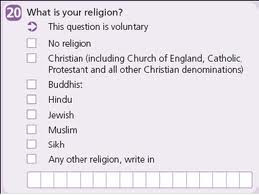 Originally printed in Gair Rhydd, 28th April 2011.
Originally printed in Gair Rhydd, 28th April 2011.
There are three kinds of lies, the saying goes: lies, damned lies and statistics. One statistic has proved particularly controversial: the 2001 census found that 72% of the population described themselves as “Christian”. With the 2011 census, the fight is on to get it changed.
“If you’re not religious, for God’s sake say so”, runs the British Humanist Association’s (BHA) campaign slogan to encourage non-believers to register their disbelief in the current census. As a Christian, I can see no possible objection to having an accurate picture of the nation’s beliefs. It seems pretty likely that religion is in continued decline in Britain. But the real controversy is over how these statistics are used politically.
The BHA argues that the census figures on religious affiliation were used to justify increasing the number of faith schools, special privileges for religious groups in equality law and other legislation, retaining Bishops in the House of Lords and much more. The campaign to get people to tick the non-religious box is also about decreasing religion’s influence in the public sphere.
It’s right to take the question of religion seriously. It makes an everlasting difference if we will face a choice of heaven or hell, or if we will be reborn in a cycle of reincarnation, or if this life is all we get, and so on. It’s in no-one’s interest for someone to think themself a member of a religion without really understanding and being committed to its teachings and practices.
It’s not just eternity, either: religion makes all the difference to everything from education to marriage, from war to abortion. Our beliefs should not be a matter of habit or cultural identity, but of personal, rational conviction. What we believe really matters, so tick what you really believe on the census.
But I think using religious statistics to make political arguments, whether by the non-religious or religious, misses the point. Political issues are usually questions of principle – statistics shouldn’t come into it. Rights and freedoms and responsibilities should apply to everyone equally.
If faith schools are acceptable, then statistics might decide which faiths are taught where, what the distribution should be of Christian, Jewish, Islamic, Buddhist, secular and so on. But statistics can’t tell us whether or not religion ought to be taught at all in schools in the first place. Should education be religion-free, to allow children to make up their own minds? Or would a secular education simply mean secular indoctrination?
Or take the example of Owen and Eunice Johns, the Christian couple barred from fostering because they believe, in accordance with traditional orthodox Christianity, that homosexuality is a sin. Despite promising that they would show love and support to any child they fostered no matter their sexuality, their moral stance was deemed potentially harmful.
Whatever you think of the Johns’s beliefs, the issue can’t be decided simply by majority vote. If people have freedom of belief, then they have it even when it runs contrary to the opinion of the majority. A teenager disagreeing with their parents’ morality would be nothing new. Should an atheist like Richard Dawkins be barred from fostering, in case his belief that religion is immoral harms his child should they adopt a faith? The Johns are victims of an intolerant secularism intent on excluding faith, not on promoting freedom.
It’s also wrong to assume that all people of a particular religion will support a particular policy, and neither does being non-religious necessarily imply support of secularist politics. To treat religious affiliation like a vote for a political party is a logical confusion and an abuse of statistics.
Let’s stop the statistical one-upmanship right now. I don’t want any special privileges or exceptions for religious people, but for everyone, both religious and non-religious, to have the same freedom to live according to their beliefs and principles – even for Jedis!

